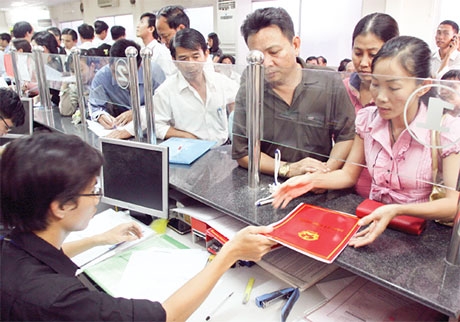Wage reforms make sense

The draft law on minimum wage is being penned by the Ministry of Labour, Invalids and Social Affairs (MoLISA) and slated for completion to submit to the government and the National Assembly for approval in May.
The draft law has been circulated to gather comments from state agencies and experts.
According to MoLISA’s Legislation Department, the law’s major target was to have in place a wage policy based on market rules and gradually stamp out the low minimum wage scheme.
“The draft law encompasses two important changes. It is proposed to cover labour relations in the public and private sectors and more importantly, it separates wages paid to state employees and to people in the armed force from the minimum wage law,” said head of MoLISA’s Labour-Wage Department Tong Thi Minh.
Besides, the draft law seeks to regulate minimum wages per day and hour.
“Separating state employees’ wages from the minimum wage law is a smart move. Only when this regulation gets the nod, can the wage be adjusted following market rules, not badly affecting state budget,” Minh said.
International Labour Organization expert Sangheon Lee assumed it was important to split state budget funded sector wage from the minimum wage law since most countries have developed a specific wage policy for the state sector.
Head of Ministry of Home Affairs’ Wage Department Doan Cuong, while advocating wage separation, voiced concerns over how state employees’ wage be calculated to ensure fairness.
Cuong said state employees also wanted their wage to be set based on market rules.
“If state sector wage is no set based on market rules, the ‘brain drain’ may happen more aggressively and talents would shift to work for private enterprises or foreign entities,” Cuong argued.
In this respect, former member of prime minister’s research department Vu Quoc Tuan said while separating wages of the administrative non-productive sector from the minimum wage law Singapore and other countries have developed minimum and maximum wage schemes to ensure state employees have decent incomes with certain accumulations depending on their specific jobs.
The employees, however, when working in the state sector should not require equal wage levels like those applied to the corporate sector since businesses pay wage based on target profits whereas the state sector was not a service sector, according to Tuan.
What the stars mean:
★ Poor ★ ★ Promising ★★★ Good ★★★★ Very good ★★★★★ Exceptional
Related Contents
Latest News
More News
- Hermes joins Long Thanh cargo terminal development (February 04, 2026 | 15:59)
- SCG enhances production and distribution in Vietnam (February 04, 2026 | 08:00)
- UNIVACCO strengthens Asia expansion with Vietnam facility (February 03, 2026 | 08:00)
- Cai Mep Ha Port project wins approval with $1.95bn investment (February 02, 2026 | 16:17)
- Repositioning Vietnam in Asia’s manufacturing race (February 02, 2026 | 16:00)
- Manufacturing growth remains solid in early 2026 (February 02, 2026 | 15:28)
- Navigating venture capital trends across the continent (February 02, 2026 | 14:00)
- Motivations to achieve high growth (February 02, 2026 | 11:00)
- Capacity and regulations among British areas of expertise in IFCs (February 02, 2026 | 09:09)
- Transition underway in German investment across Vietnam (February 02, 2026 | 08:00)

 Tag:
Tag:




















 Mobile Version
Mobile Version